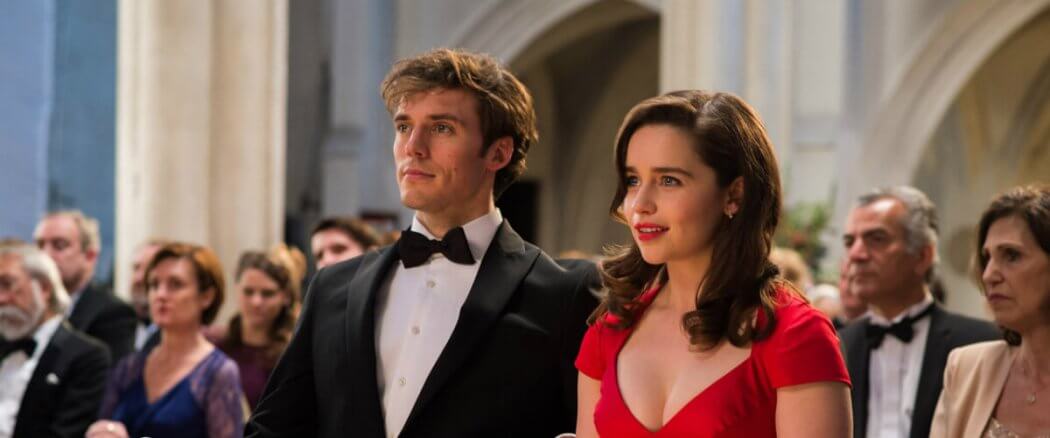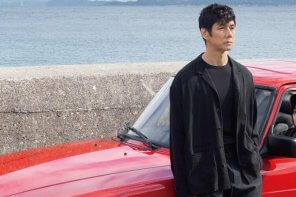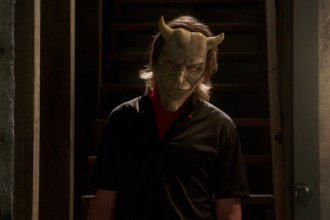What would you do if almost all the activities by which you define yourself… that you look forward to doing day-in and day-out, were suddenly, irrevocably snatched from you and replaced by hourly never-ending discomfort and a total dependency on others for the most menial of your daily activities of living? Really, think about it. What would your attitude be towards living the rest of your life with all those things permanently stricken from your abilities?
Billed as the romantic event of the summer cinema season, Me Before You opened to generally lackluster critical reviews but markedly higher evaluations from the viewing public (allegedly made up in the majority by younger women, although the audience with which my wife and I viewed it had many men and older women). The press also seems intent on calling it a “3 hanky” movie while giving only glancing credit to the more serious issues it raises. But this film has some serious undertones having to do with personal life choices people make and whether they should do so. And even more, whether they should be allowed to do so.
Based on JoJo Moyes best-selling 2012 novel, the story was transferred to the screen with the less usual decision that the author of the book would also write the screenplay. Maybe that is how the film was made for a paltry $20 million (compared to, for instance, CGI bombs like Warcraft or Alice Through the Looking Glass at $160-$170 million). It definitely is a heavily romantic experience but also raises several issues of importance. One may watch it just for the usual touchpoints of introduction, dislike, appreciation, falling in love, separation, and redemption (not necessarily in that order for this story), but there is much more to the story if you want to delve into it. And Moyes does a very good job of putting that on the screen, even though necessarily abbreviated from her novel which contains several more storylines. The mostly female production staff includes first time director Thea Sharrock who films the story in straight-forward fashion, never letting her decisions get in the way of the narrative.
From Two Different Worlds
The film opens with the obviously successful, 35-year-old mover and shaker of the financial world Will Traynor, played by the devastatingly handsome Sam Claflin (Finnick Odair of Hunger Games – Mockingjay and William in the not very good Snow White and the Huntsman), in his London apartment with his girlfriend. He is about to leave for work but promises he will make a gourmet meal for her that evening when he returns from work (just because it is what he does). He is surrounded by photos of his physical exploits – paragliding, mountain climbing, scuba diving and on and on. Little does he know that the simple act of crossing the street outside his apartment that rainy morning will irrevocably change his life forever, rending him incapable of even the most simple of activities that we all take for granted.
 The tale shifts to Louisa “Lou” Clark, a 26-year-old still living with her parents and working as a waitress at the Buttered Bun, a small café in a sleepy English tourist town dominated by the historic Stortfold Castle (beautifully filmed). It is the only feature of the town worth giving a second glance. Times are tough with few tourists and Lou comes home from work early with the news she is now unemployed, as the proprietor of the Buttered Bun is closing shop and returning to his native Australia. The job was a dead-end but she loved it, and more importantly it provided a major part of the income her parents needed with her father being unemployed.
The tale shifts to Louisa “Lou” Clark, a 26-year-old still living with her parents and working as a waitress at the Buttered Bun, a small café in a sleepy English tourist town dominated by the historic Stortfold Castle (beautifully filmed). It is the only feature of the town worth giving a second glance. Times are tough with few tourists and Lou comes home from work early with the news she is now unemployed, as the proprietor of the Buttered Bun is closing shop and returning to his native Australia. The job was a dead-end but she loved it, and more importantly it provided a major part of the income her parents needed with her father being unemployed.
Lou is played winningly by a charming Emilia Clarke (cast against type of her portrayal as the terrifying dragon queen Daenerys Targaryen in Game of Thrones as well as Sarah Connor in the redundant Terminator Genisys). You will soon forget her in those roles as she owns Lousia, with her devastating smile and penchant for quirky, outlandish clothing (not like anyone on her salary could afford to dress that way, but “Hey it’s Hollywood” so we suspend disbelief). And one could spend the entire movie watching her eyebrows shift and contort.
To Begin With, a Predictable Story
Inevitably, the two are brought together. Louisa is desperate for a job that does not involve plucking chicken feathers (a very brief stint). Will, now a quadriplegic with only slight motion of one finger of one hand and nothing else below his neck, needs someone to help his family look after him, but ominously only for six months. Will is now living with his “old money” parents, and his father manages Stortfold Castle. She goes into the job gritting her teeth knowing she will hate it only a little less than her poultry job, but, after all, it is just for a short time. Her anxieties about her new job are verified when she finds Will to be unrelentingly icy, critical and condescending. He, and his emotionally flat mother Camilla (Janet McTeer, the narrator of Maleficent and Mary in Tumbleweeds) do nothing to minimize the class gap between the Traynors and the working class, down-on-their-luck Clarks. And Will, obviously her intellectual superior (by education), makes no effort to hide his disdain for her limited experience and knowledge, let alone her lack of ambition to rise above her lowbrow up-bringing.
 I am hardly revealing a dark secret to tell you that Will and Lou go from a relationship of intense distaste for each other to understanding and then, on an emotional if not physical level, love. The track of their relationship is all pretty predictable, plodding along in the limited time-frame of 110 mins representing 6 months. Yet it is a pleasure to watch and there are many delightful scenes and characters. Lou’s boyfriend Patrick (played as clueless by Matthew Lewis, Harry Potter’s Neville Longbottom) is a delightful cad who is a personal trainer whose entire universe revolves around his physical fitness – in direct contrast to Will’s new life.
I am hardly revealing a dark secret to tell you that Will and Lou go from a relationship of intense distaste for each other to understanding and then, on an emotional if not physical level, love. The track of their relationship is all pretty predictable, plodding along in the limited time-frame of 110 mins representing 6 months. Yet it is a pleasure to watch and there are many delightful scenes and characters. Lou’s boyfriend Patrick (played as clueless by Matthew Lewis, Harry Potter’s Neville Longbottom) is a delightful cad who is a personal trainer whose entire universe revolves around his physical fitness – in direct contrast to Will’s new life.
Me Before You is not really a romantic comedy but it has many moments which will make you, at the least, smile warmly. The scene where Will unexpectedly visits Lou’s small, crowded home for her birthday party that she had politely asked him to, never thinking he would agree, is priceless – especially when her father extends his hand to shake the quad’s. But Lou’s family has inner strength that Will does not see in his home, including a doting mother who makes sure everyone’s plate is full (even as Will has to be spoon fed) and prayers that are said around the table. Patrick becomes jealous and Will’s departing comment to him is a classic “walk-off”… or should I say “wheel-off” line. Score one for the good guys.
The novel, of course, has much more depth and complexity with various meaningful subplots which are well handled on the pages but wisely omitted from the film. One of the main plot points still included in the film has to do with Lou’s low expectations for herself and, as Will eventually points out, she is always finding a reason to put other’s ambitions before herself. (Hmm… have I not read something like that in the Bible somewhere… “the first will become last” or some such?). Will tells her to live big, just like he used to be able to do. (In case you were wondering, insert the film’s title here.) I have some problems with this as a pervasive, underlying philosophy but “all things in moderation.”
The Secret of the Story
It is impossible for me to review Me Before You without (mostly) revealing the “Big Secret”, which you have probably guessed by now. So if you are still hoping for ‘the secret” to be a surprise (assuming you have not read one single other thing about this movie because then you would already know) STOP NOW!
The issue which makes this romance interesting to me, given my profession, is that Will has made what he considers to be a rational decision that he does not wish to any longer live in this state and, if it cannot be changed, he does not want to any longer live at all. The prospects for any medical advance that would make a significant difference in his life are bleak (perhaps not completely true in the real world but close to it.) Will’s parents are, of course, devastated by his decision so he gives them a reprieve of six more months (the reason for this is never made clear). Then he will voluntarily end his life at Dignatas, an actual assisted suicide organization in Switzerland (brochure available online if you must.)
Why, Will?
Will decides to take this course of action because (from the book and similar to what he says in the film) “I loved my life, Clark. Really loved it. I loved my job, my travels, the things I was. I loved being a physical person. I liked riding my motorbike, hurling myself off great heights. I liked crushing people in business deals. I liked having sex. Lots of sex. I lead a big life. I am not designed to exist in this thing [indicating his motorized chair] and yet for all intents and purposes it is now the only thing that defines me… I need it to end here. No more chair. No more pneumonia. No more burning limbs. No more pain and tiredness and waking up every morning already wishing it was over.” And even the fact he has been impacted by Lou’s love cannot shake him from the fact that he finds the daily pain and humiliation of his life not worth bearing. (Thereby the 3 hankies for the more emotional.)
 One can look at his statement and accuse Will of being stubborn and selfish… of seeing value in his life only by its physical capabilities. There is no mention of spirituality. There is no seeking a different, more cerebral plane of existence. But it is his feeling that nothing else matters to him; he desires to be in control of his own life and decisions. Part of the reason he so bridles at his mother’s interference in his life is that she, without thought, makes all the decisions as if he were a piece of furniture. At one point when she is directing what is to be done he says “I’m here, Mother. You don’t have to talk across me. My brain isn’t paralyzed… yet.” His loss of autonomy is unbearable for him.
One can look at his statement and accuse Will of being stubborn and selfish… of seeing value in his life only by its physical capabilities. There is no mention of spirituality. There is no seeking a different, more cerebral plane of existence. But it is his feeling that nothing else matters to him; he desires to be in control of his own life and decisions. Part of the reason he so bridles at his mother’s interference in his life is that she, without thought, makes all the decisions as if he were a piece of furniture. At one point when she is directing what is to be done he says “I’m here, Mother. You don’t have to talk across me. My brain isn’t paralyzed… yet.” His loss of autonomy is unbearable for him.
It is easy for Lou (or me) to say there is “more to life” than what you can physically demand of yourself, but Lou/I am not the one having my bladder drained, our buttocks wiped and our need for repositioning totally dependent on someone else. Lou/I am not facing a future of never having sexual intimacy. Lou/I am not the one who goes into a medical crisis when we come down with what, for others, would be minor illness. These are real dilemmas, and I have seen people struggle with them and am saddened by the bleakness of their lives.
Me Before You puts a glossy, romantic shine on all this which distorts the reality of such a situation. Even the book is fairly superficial about the issues involved. Will Traynor, except for a few occasions, looks disarmingly handsome throughout the story arc, which is not in any way “real.” Where most quads have a slow but steady decline requiring more and more medical attention (think Christopher Reeve), Will Traynor seems to bounce back from every physical insult without any lasting effect. In his last frame he is just as handsome, well-toned and tan as in his first. Real life for quads is not like that.
Press Reaction
Secular reviews of Me Before You gave short shrift to the entire “assisted-suicide-for-the-disabled” issue. On the other hand many Christian sites either ignored the film (Christianity Today) or went out of their way to chastise and condemn it. One Christian artist I admire tweeted that the film “started out as sweet, turned into propaganda for assisted suicide” (here). Ted Baehr’s MovieGuide unsurprisingly says its content was “abhorrent” and states it is “an unlikely, unconvincing romance [that] leads to an evil, stupid decision.” Plugged-In’s conclusion was that “The movie’s determination to romanticize assisted suicide sends the chilling message to others who suffer similarly that their lives aren’t worth living either. That they, too, should just kill themselves.”
Likewise many in the disabled community have criticized the film, firstly for the casting of the able bodied Claflin as Will, labeled sarcastically by the community members as “cripface” casting. In addition and more vehemently, many in the disabled community object to the film’s “ableism,” that is, its discrimination or prejudice by the able-bodied against individuals with disabilities. They point to this film (and Million Dollar Baby, another prominent example) as Hollywood telling the public “that it’s better for this person (Will) to die in order to be of service to her (Lou) than for him to live.”
 I disagree that this film/novel is telling “others who suffer similarly that their lives aren’t worth living.” I believe we should consider that it may be a person’s right to at the least be able to discuss this issue without being condemned. As Jojo Moyes says (in an addendum to her novel), “The novel was really spurred by a news story I heard about a young rugby player who was left quadriplegic after an accident and who persuaded his parents to take him to Dignatas… to allow him to go through with an assisted suicide. I couldn’t believe any parent would agree to do that – and yet the more I read up on his story, the more I realized the issue was not as clear-cut as I would have liked to believe.”
I disagree that this film/novel is telling “others who suffer similarly that their lives aren’t worth living.” I believe we should consider that it may be a person’s right to at the least be able to discuss this issue without being condemned. As Jojo Moyes says (in an addendum to her novel), “The novel was really spurred by a news story I heard about a young rugby player who was left quadriplegic after an accident and who persuaded his parents to take him to Dignatas… to allow him to go through with an assisted suicide. I couldn’t believe any parent would agree to do that – and yet the more I read up on his story, the more I realized the issue was not as clear-cut as I would have liked to believe.”
A more calm critique of the “ablest assumptions” most of us have and which many feel is prevalent in Me Before You was written by Charles Camosy at Crosswalk. He states that the main complaint from “nearly the entire disability community” is that Will’s story is “cherry-picked” and not representative of most who choose assisted suicide. He also lays out concerns of the slippery slope of “The right to die” becoming “A duty to die.” However, he cannot seem to stay away from hysteria when he says Me Before You “overflows with dehumanizing stereotypes about disability, from implications that disabled people are no more active than houseplants, to assumptions that disability is a fate worse than death.” That statement is most certainly not true. It is Will alone who makes that decision while everyone around him tries to dissuade him.
A Difficult Issue – How Do Christ Followers Respond?
Like all challenges, some people have the fortitude to overcome great loss but some do not. The strong among us may be able to transcend their limited physical status to reach out in other ways, to feel loved by God and love others in return. But many choose to look for an “out.” Do we as Christians, who believe every life is a gift from God, have a right to insist on… to enforce the preserving of the life of someone who does not believe his or hers any longer has that worth? Do we have a right to pass laws that prevent them from doing what they see as a rational act that hurts no one? If we are so sure we have that right, what does it say for those of us who support capital punishment or who turn (almost) deaf ears to the thousands of children dying of hunger in the world every day?
Having seen such suffering first hand, I am no longer as certain. More and more states are passing laws which permit assisted suicide — the new California law will allow an estimated initial 3500 people to have the choice to legally terminate their own life (if their life expectancy is less than 6 months – not really the same situation as Will Traynor was facing.) Even in this day, the suffering of some people in the last days, weeks and months of their lives is a terrible thing. This is something we as the faith community need to deal with in a better fashion than “Just Say No.”
I have not even brought up the dilemma of our aging population and Alzheimer’s as well as other chronic debilitating diseases, which we are all more likely to have with each passing decade we live. And we old people are living a lot more decades. I know personally I would struggle with what I should do if I were facing that inevitable demise with its anguish and heartbreak for my family. (See Still Alice and, especially, Away from Her). Should I have a right to end my life when I can no longer comprehend my family, or even my God? When I am an oppressive (and hugely expensive) burden on my caregivers? But ahh, there is that slippery slope again. And that thing about the sanctity of life. God please help me out here.
So see this movie – just for the pleasant diversion of a superficial and heartbreaking romance with delightful actors — that will be the experience of many. Or see it to stimulate you to think of deeper issues upon which it touches. And to think about the difference between what is the right action for we Christ followers versus what we should legislate for the “good of society.”
“I cry out, ‘My splendor is gone! Everything I had hoped for from the Lord is lost!’
The thought of my suffering and homelessness is bitter beyond words.
I will never forget this awful time, as I grieve over my loss.
Yet I still dare to hope when I remember this:
The faithful love of the Lord never ends! His mercies never cease.
Great is His faithfulness: His mercies begin afresh each morning.”
Lamentations 3:18-23 (NLT)





